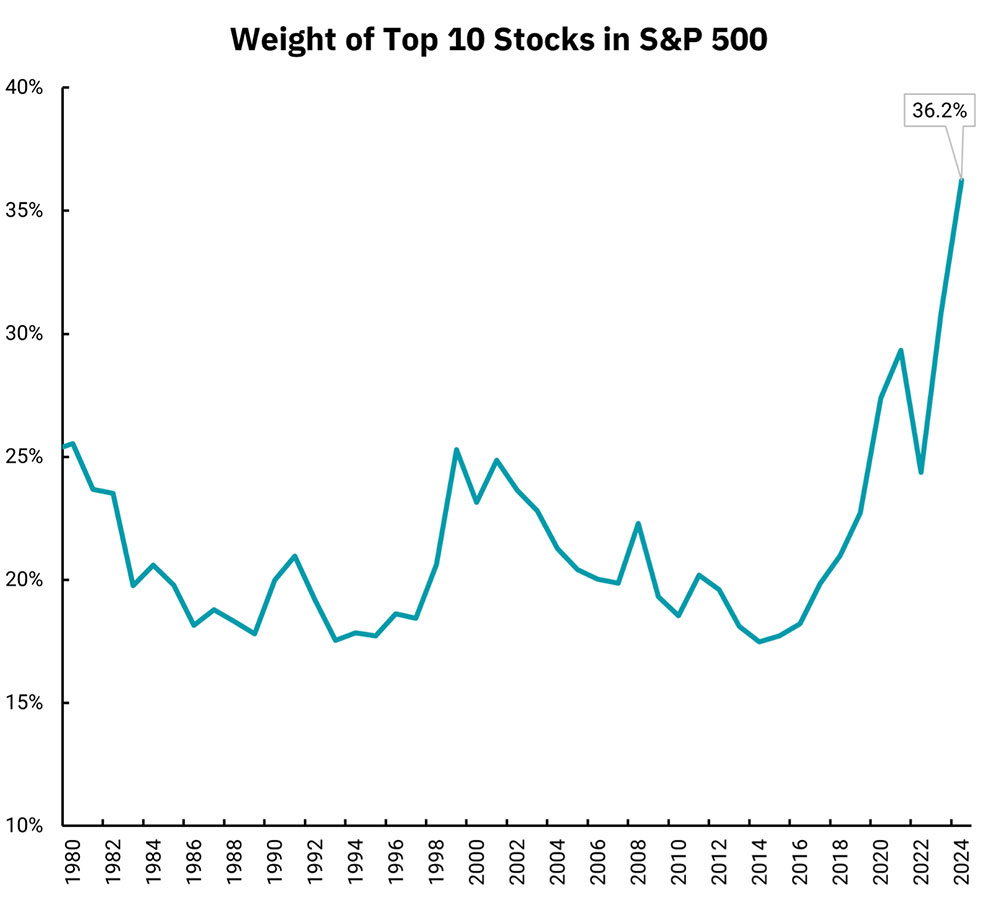
How long will the ‘Magnificent 7’ stock party last?
Focusing only on one group of investments may be costly, experts caution
Throughout 2023 and much of 2024, a handful of large-cap tech stocks known as the “Magnificent 7” anchored the gains of the S&P 500. As a result, many investors flocked to the Mag 7, riding the coattails of the biggest names in cloud computing, artificial intelligence (AI) and mobile technologies—but at the cost of portfolio diversification. And so, as we enter 2025, the questions abound: How long will the Mag 7 party last? Will the rest of the market pull its weight this year? And is the conventional wisdom of a broadly diversified portfolio still valid?
The results of the 2024 presidential election may offer some early insights, according to Brian Henderson, chief investment officer of BOK Financial®. For instance, Trump’s proposed tariffs should strengthen the U.S. dollar, which tends to help smaller and mid-sized companies and, in turn, their stocks.
"We're already seeing better performance out of small- and mid-cap stocks—and I think it's largely driven on anticipation that Trump will be able to get his economic policies through,” he said.
In deference to tech titans
Nevertheless, there is still plenty of evidence to suggest the Mag 7 will have another strong year, said Wes Verdel, senior quantitative equity portfolio manager at Cavanal Hill Investment Management, Inc., which is a subsidiary of BOKF, NA.
“There are good reasons these companies have done as well as they have,” he said. “They are high-tech companies that rely primarily on knowledge workers (as opposed to manual labor and huge capital investments); they have the flexibility to expand all over the world and make course corrections with relative ease. The power of their own technology, including AI, also helps them continuously improve and reinvent themselves, so it’s not unreasonable to think their stocks will continue to rise.”
Diversification still makes sense
However, even with tailwinds continuing to benefit Mag 7 stocks, placing outsized bets on a small handful of stocks isn’t the best strategy for most long-term investors, said Liu Liu, director of investment research and management at BOK Financial.
“We are starting to see the market broaden out. And this may continue as monetary policy eases further and creates more business-friendly conditions for all companies—not just technology companies.”- Liu Liu, director of investment research and management at BOK Financial
“Over the long term, we still believe that sensible diversification not just across stocks, but across different asset classes such as fixed income, equity and alternatives, is the best bet,” she said.
View the market with a wide-angle lens
As always, stock market performance depends on both macro- and microeconomic factors, so while deciphering the tea leaves of economic indicators can provide valuable insights, Verdel cautioned investors not to fixate too much on any one thing.
"All of these issues—inflation, unemployment, government spending and economic growth—play a combined role in how stocks perform. But placing too much weight on any one headline—rate cuts, for example—could produce an incomplete picture,” he said.
Liu echoed that sentiment, recommending that investors revisit proven asset allocation approaches.
“Since equities finished the year strong, many investors’ asset allocations may now be overweighted in stocks. Now would be a good time to rebalance your portfolio to ensure the optimal mix of risk and reward for your goals,” she said. “As we start 2025, now may be time to look at tax-loss harvesting opportunities, selling off losing investments to help offset capital gains taxes you may incur.”
No matter where stocks are headed this year, the value of a long-time horizon and professional financial advice cannot be overstated, Liu said.
“Compared to attempting to time the market, the vast majority of investors would be better served by working with a qualified advisor to implement tried-and-true investment principles over many years,” she said.
INVESTMENT AND INSURANCE PRODUCTS ARE: NOT FDIC INSURED | NOT GUARANTEED BY THE BANK OR ITS AFFILIATES | NOT DEPOSITS | NOT INSURED BY ANY FEDERAL GOVERNMENT AGENCY | MAY LOSE VALUE.
The content in this article is for informational and educational purposes only and does not constitute legal, tax or investment advice. Always consult with a qualified financial professional, accountant or lawyer for legal, tax and investment advice. Neither BOK Financial Corporation nor its affiliates offer legal advice.
2025 Outlook
A new year is often associated with transformation. Even so, the degree of change ahead in 2025 looks unusually large for the U.S., with potential shifts in trade policy, immigration, regulation and more. BOK Financial's investment management team has prepared its 2025 market outlook as a downloadable report, supplemental articles and a recorded webinar.

